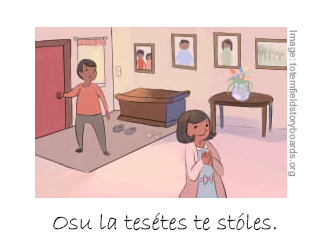Osu la tesétes te stóles means ‘So he goes up to his wife.’
Literally it means ‘So goes approaches (he) the wife (his)’. ‘He’ and ‘his’ are understood from context.
Vocabulary and Pronunciation
- osu – so (a general sentence connector, osu often does not translate into English)
- la – go (this is a shortened form of lám – to go. La functions here as a ‘helper’ or ‘auxiliary’ verb indicating the direction of motion, before the main verb)
- tesét – approach, go up to
- -es – you add this ending with certain verbs whenever the subject is ‘he‘ or another ‘third person’ noun.
- te – a, the
- stóles – wife
Audio: Elizabeth Herrling
Structure
The structure of this phrase is as follows:
Notes:
- There is not overt word for ‘he‘ or ‘his‘ in the sentence. He and his are just understood from context. You could also make them explicit by saying Osu la tesétes tútl’o te stoles tútl’o.
- There may be a possessive ending –s at the end of stoles, so literally stoles-s. However, the two s‘s blend into one.
- The –es ending, as noted above, is required on certain verbs whenever ‘he‘ (or another ‘third person’ noun) is the subject.



No comments yet.